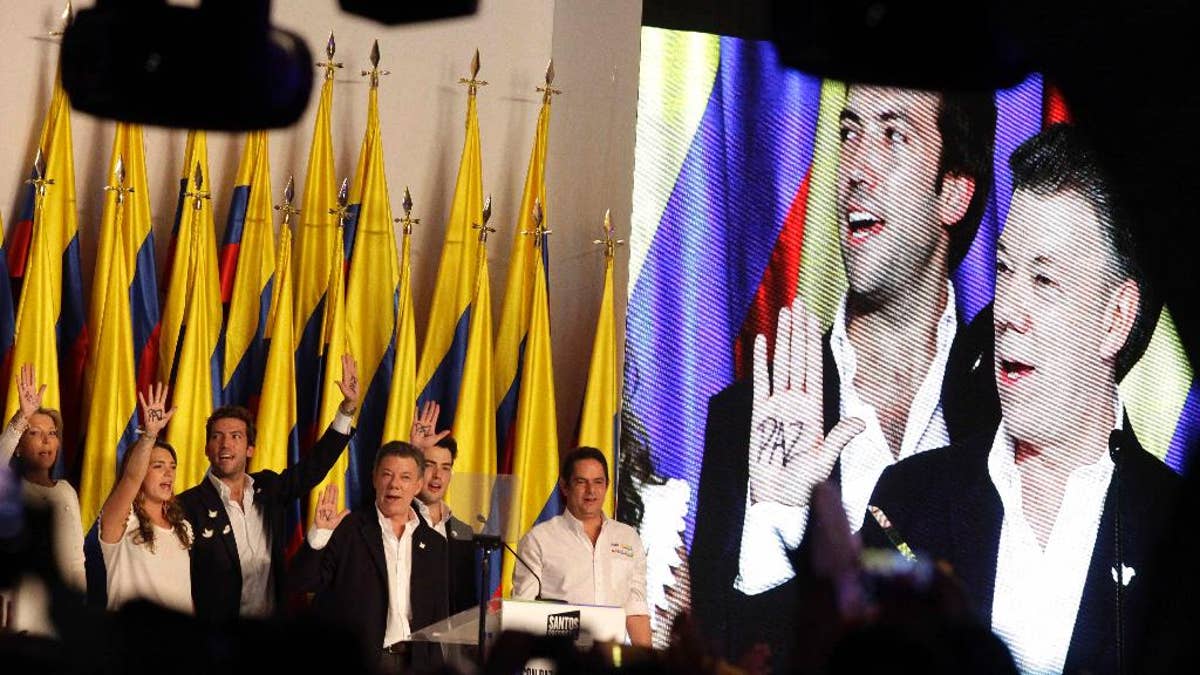
President Juan Manuel Santos, on screen at far right, celebrates winning the presidential runoff election, surrounded by his family at his campaign headquarters in Bogota, Colombia, Sunday, June 15, 2014. Behind Santos on the screen is his son Martin Santos. Santos defeated challenger Oscar Ivan Zuluaga, of the Democratic Center, and won a second four-year term. (AP Photo/Javier Galeano) (The Associated Press)
BOGOTA, Colombia – The pressure is on President Juan Manuel Santos to accelerate peace efforts after pinning his re-election on 18-month-old negotiations to end Colombia's half-century conflict.
Santos is promising to devote all his energies to peace. But, unlike in his first four-year term, he could face serious opposition in Congress from adherents of Alvaro Uribe, the hard-line former president viewed by many as the true challenger in Sunday's runoff.
Santos defeated Uribe's hand-picked candidate, former finance minister Oscar Zuluaga, winning 53 percent to 47 percent of the ballots cast for candidates. More than 600,000 voters, or 4 percent of those who turned out at polls, cast "blank" ballots as a protest.
In last month's first-round ballot, Zuluaga won more votes than Santos, but the incumbent secured his re-election by mustering what analysts called an impressive political machine, particularly on the Caribbean coast. The political left also endorsed him.
While Zuluaga graciously conceded defeat, Uribe cried foul Sunday night, alleging "the biggest corruption in history" had occurred and suggesting Santos' campaign used leftist rebels to intimidate voters.
Independent election monitors reported no major irregularities and the head of the Organization of American States mission, former Costa Rican President Jose Maria Figueres, said Monday that he had received no formal complaint from Uribe.
Figueres called the election "the most peaceful and tranquil in this country's history."
Uribe, who takes a seat in the Senate next month where he will lead the opposition, pressed his attack in a Monday radio interview, accusing the incumbent of turning vote-buying into "a national institution."
"'There is a clear purchase of votes here and a clear fraud," he said.
Santos did not immediately respond to the accusations.
Santos told the nation Sunday night that his victory affirmed his claim to be ably steering Colombia through a historic moment — out of a crippling conflict that has claimed more than 200,000 lives.
He promised to devote "all my energies and all the energies of my government" to securing peace. "In four years, no one will regret having voted for us."
Besides serious resistance from the Uribe camp, he could face opposition from Conservative Party lawmakers if they think he is making too many concessions to the rebel Revolutionary Armed Forces of Colombia, or FARC.
Uribe and Zuluaga have said Santos intends to offer impunity to the rebels, which the president denies. Yet FARC leaders have made it clear they have no intention of doing jail time.
So far, the two sides have reached framework agreements on instituting land reforms, dismantling the illegal drug trade and creating a role for rebels in national politics. The government says it has completed most of the agenda, but the talks have been secret and Santos has been widely criticized for poorly communicating their gains to fellow Colombians.
Among major issues will be whether FARC leaders accept responsibility for war crimes, something for which Santos says perpetrators on both sides must be held accountable, and their disarmament, which is a firm government condition.
Even if Santos can obtain a peace accord, he still will have to get it approved not just in Congress but also by voters, having promised a referendum.
"The referendum is like putting a rope around your neck," said Javier Ciurlizza, regional director of the International Crisis Group. "I haven't seen any other peace process that has submitted itself to that."
